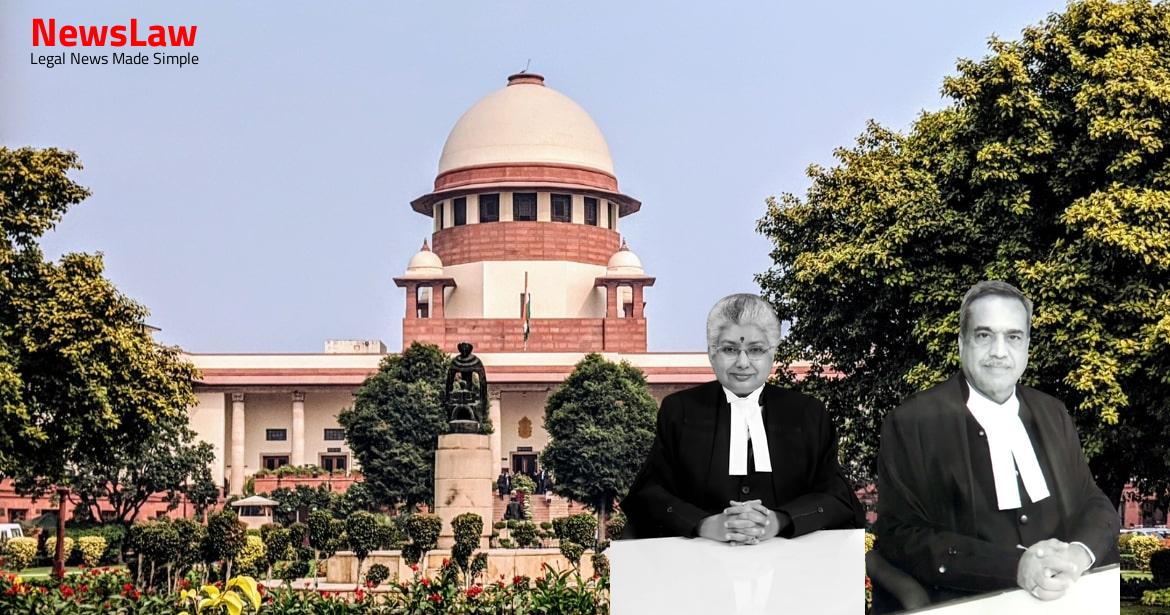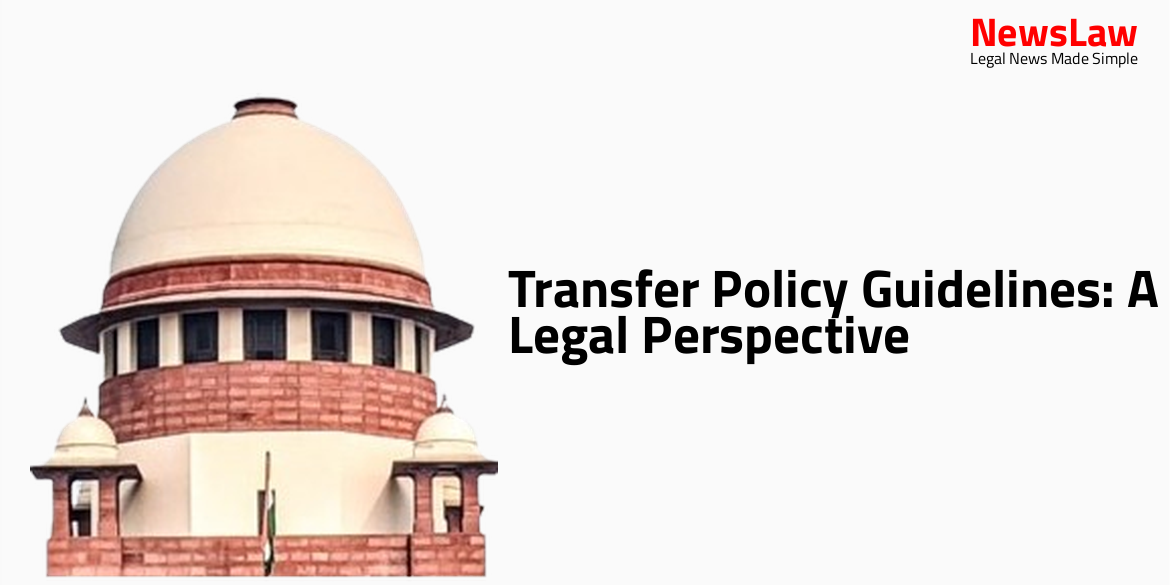Explore the detailed legal examination undertaken by the Court regarding the validity of a Compromise Decree in our latest case analysis. By focusing on the provisions of Order XXXII Rules 1 to 7 CPC, the Court’s thorough legal scrutiny provides valuable insights into the nuances of the case. Follow along to understand the intricacies of consent decrees, the impact of unlawful compromises, and the significance of specific legal provisions in determining the validity of agreements.
Facts
- The High Court allowed the appeal and set aside the Trial Court’s order rejecting the plaint.
- The matter was remanded to the Trial Court as the provisions of Order XXXII Rules 1 to 7 CPC were not considered by the Trial Court.
- The High Court observed that the above provisions would affect the validity of the Compromise Decree dated 13.01.2016 in O.S. No.1750 of 2015.
- Original defendant Nos. 2 and 4, the Developer and its Assignee, filed the present appeals against the High Court’s judgment.
- A Compromise Decree was passed in O.S. No.1750 of 2015 based on a Memorandum of Compromise.
- The developer assigned its development rights to respondent No.4 under a Deed of Assignment.
- Under the Compromise, respondent No.1 was entitled to 35,000 sq. ft. of the constructed area.
- The father of respondent No.1 filed a suit seeking declaration of the revocation of a Gift Deed as illegal.
- A compromise was reached between the parties in the suit.
- A Development Agreement-cum-General Power of Attorney was executed between the grandmother of the plaintiff and the appellant.
- The development rights under the Development Agreement were assigned to third parties.
- I.A. No.31 of 2016 was filed along with the Compromise Memo for passing of a decree.
- The plaintiff in O.S. No.537 of 2018 filed for declaration of right, title, and interest over the property and Compromise Decree.
- The appellant filed I.A. No.108 of 2019 seeking rejection of the plaint on various grounds.
- The suit schedule property was gifted to the plaintiff during his minority by his paternal grandmother.
Also Read: Ruling on Circumstantial Evidence in Murder Case
Arguments
- The appellant argued that the High Court erred in quashing the rejection of the plaint by the Trial Court under Order VII Rule 11 CPC.
- Referring to various court decisions, it was emphasized that under Order XXIII Rule 3 CPC, compromise of a suit is allowed.
- The appellant highlighted the lack of discussion by the High Court on the maintainability of the suit and Order XXIII Rule 3A CPC, which led to the rejection of the plaint by the Trial Court.
- The original plaintiff’s counsel opposed the appeals, stating that Rule 3A bars suits to set aside a decree based on compromise.
- It was argued that the suit sought multiple reliefs aside from the Compromise Decree, making it an abuse of process of law.
- The appellant contended that the plaintiff cleverly drafted the prayers to challenge the Compromise Decree, which is barred under Order XXIII Rule 3A CPC.
- Citing previous court decisions, it was asserted that the only recourse for such grievances is through an application in the same court that recorded the compromise.
- The High Court was criticized for delving into the validity of the Compromise Decree under Order XXXII Rules 1 to 7 CPC instead of focusing on the suit’s maintainability.
- The respondent is unable to dispute that the plaintiff can make submissions on the validity of the Compromise Decree, including non-compliance of Order XXXII Rule 7 CPC.
- The prayer is to declare that the Compromise Decree is not binding on the respondent.
- The plaintiff has filed an application under Order XXIII Rule 3A before the same Court that passed the Compromise Decree.
- The respondent argues that an independent suit under Order XXIII Rule 3A shall not be barred for the other reliefs sought.
- The plaintiff has not prayed to set aside the Compromise Decree.
Also Read: Challenging Legal Presumptions in Negotiable Instrument Cases
Analysis
- The only remedy to avoid a consent decree is to approach the court that recorded the compromise and made the decree.
- Lawfulness of an agreement or compromise has to be determined by the concerned court.
- A consent decree operates as an estoppel unless set aside by the court that passed it.
- Multiple reliefs sought in a suit can be a clever way to challenge a compromise decree.
- A plaint can be rejected under Order 7 Rule 11 CPC if found vexatious or meritless.
- Activist Judges are needed to address irresponsible lawsuits.
- Circumventing laws by clever drafting is not allowed.
- Several amendments in Order 23 of the Civil Procedure Code aim to streamline suits.
- No suit can be filed to set aside a decree based on an unlawful compromise under Order 23 Rule 3A CPC.
- The validity of a consent decree hinges on the validity of the agreement or compromise.
- The High Court erred in not considering the maintainability of the suit challenging the Compromise Decree under Order 23 Rule 3A CPC.
- No appeal is maintainable against a consent decree due to the bar in Section 96(3) CPC.
- No appeal is maintainable against the order recording or refusing to record a compromise.
- Independent suits cannot be filed to set aside a compromise decree if the compromise was not lawful.
- The court which passed the decree based on the compromise is the only authority to determine its lawfulness.
- Approaching the court which recorded the compromise is the only remedy to avoid a consent decree.
- A suit challenging a compromise decree as not lawful must be brought to the same court which recorded the compromise.
- Order 23 Rule 3-A bars suits to set aside decrees based on void or voidable compromises.
- The objective of compromise is to end disputes and avoid multiple litigations.
- Compromise agreements will not be deemed lawful if they are void or voidable under the Contract Act, 1872.
- Rule 3-A of Order 23 CPC bars suits to set aside decrees due to unlawful compromises.
- The Amendment Act, 1976 aims to direct challenges to compromise agreements to the court that recorded them.
- Rule 3 Order 23 was amended to curtail vexatious and tiring litigation challenging a compromise decree.
- Specific requirements introduced before a compromise is recorded by the court including that the lawful agreement or compromise must be in writing and signed by the parties.
- A proviso with an Explanation was added to address situations where one party alleges an adjustment or satisfaction that the other party denies.
- Rule 3-A was added to bar suits to set aside a decree based on a compromise if the compromise was not lawful.
- An agreement or compromise void under the Indian Contract Act, 1872, shall not be lawful within the meaning of the Rule.
- The purpose of the amendment was to compel parties to question compromises before the court that recorded them.
- Courts were tasked to decide if parties arrived at an adjustment lawfully.
- A specific bar was introduced to avoid multiplicity of suits and prolonged litigation.
- Rule 1 Order 23 allows plaintiffs to abandon a suit or a part of their claim at any time after institution.
- The Court has the discretion to grant permission to withdraw a suit with liberty to institute a fresh suit under certain conditions.
- If the plaintiff abandons or withdraws a suit without permission, they are precluded from instituting a suit on the same subject matter.
Also Read: Legal Analysis Critique in High Court’s Quashing Order
Case Title: M/S. SREE SURYA DEVELOPERS AND PROMOTERS Vs. N. SAILESH PRASAD (2022 INSC 167)
Case Number: C.A. No.-000439-000439 / 2022



